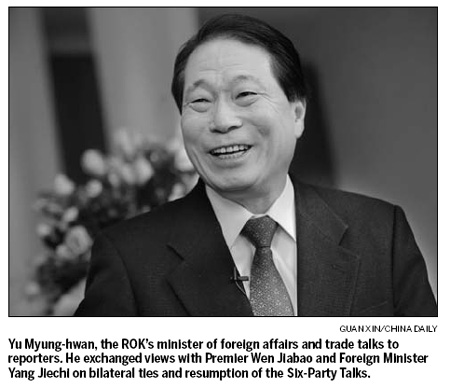Asia-Pacific
Pyongyang sent positive signals about talks, Seoul official says
By Zhang Jin and Li Xiaokun (China Daily)
Updated: 2010-03-19 07:46
 |
Large Medium Small |

Group to study feasibility of free trade among China, ROK and Japan soon
BEIJING: Pyongyang recently sent improved signals regarding its return to the stalled Six-Party Talks, Seoul's top diplomat told China Daily in an interview Thursday.
The visiting official, however, said it was difficult to predict exactly when the talks would resume.
Earlier this month, Wu Dawei, China's top envoy on the Korean Peninsula issue, said he expected the talks - which involves China, the ROK, the Democratic People's Republic of Korea (DPRK), the United States, Japan and Russia - to reopen in the first half of the year.
The DPRK walked away from the negotiating table in April last year after the United Nations condemned its rocket launch.
Late last year, concerted diplomatic efforts by countries including China and the US helped win the DPRK's pledge to return to the talks.
Yu urged the DPRK to abandon its two preconditions - lifting of UN sanctions and launching a discussion on a peace treaty - and return to the negotiating table. Yu also said Seoul was willing to hold comprehensive discussions with Pyongyang.
"We have been in, and will push forward, dialogues" between the ROK and the DPRK, he said, hoping the northern neighbor would go beyond cooperation in the industrial and tourism sectors.
East Asian FTA
Yu also said a joint group to study the feasibility of a free-trade area (FTA) grouping China, the ROK and Japan, would be launched soon.
The three countries have reached a consensus on the feasibility study of the FTA, Asia's largest in terms of GDP, Yu said. The research is expected to bring together personnel from government, business and academia.
FTAs are mushrooming in Asia but efforts to integrate the East Asian trio have lagged chiefly due to political differences. The three nations have separately established FTAs with the 10-nation Association of Southeast Asian Nations, but not amongst themselves.
The worst financial crisis in seven decades has expedited the need for cooperation, Yu said.
The Chinese and ROK economies are highly interdependent, he said. Growth in the ROK fell by 4.2 percent in the first quarter last year; the Chinese economy grew at its slowest pace in years, at 6.2 percent. China's stimulus measures shored up its economy in the second quarter, and the ROK too saw a rebound, Yu said.
China is now the ROK's largest trading partner and biggest investment destination.
The ROK is one of the few countries that enjoy a trade surplus against China, the world's largest exporter. The surplus amounted to $32.5 billion last year, compared with $14.5 billion in 2008.
Yu, however, said the sharp rise was only temporary and could be chiefly attributed to the appreciation of the ROK currency, the won, against the greenback.










